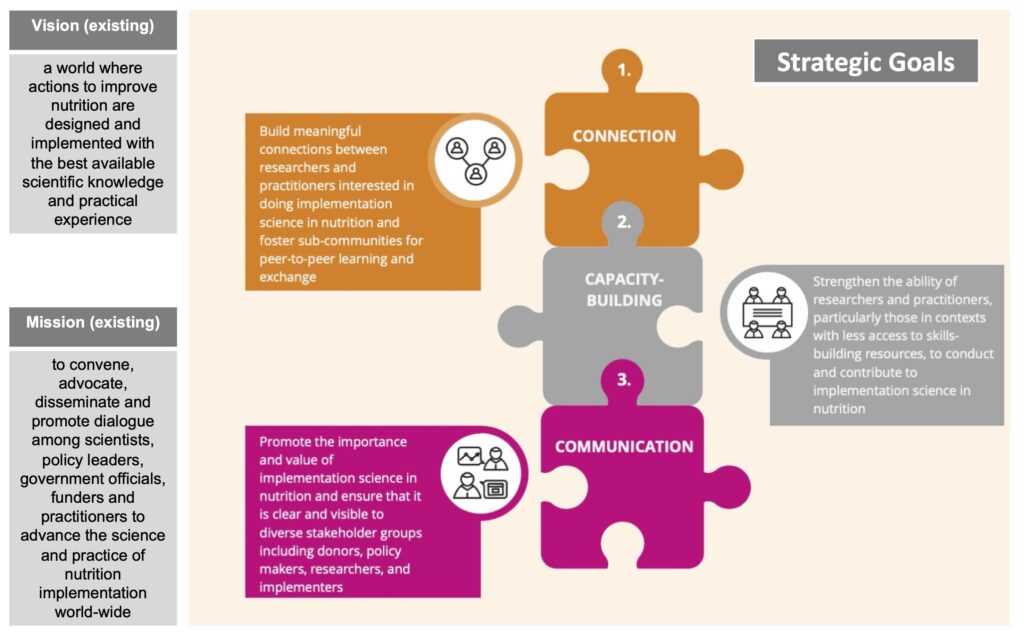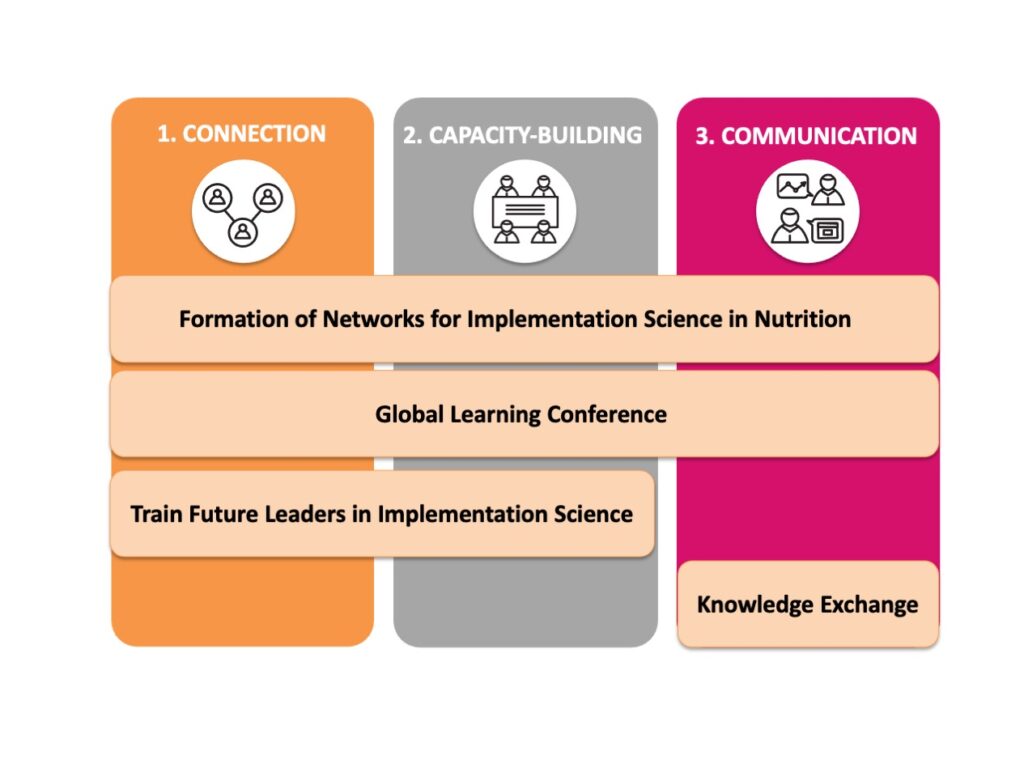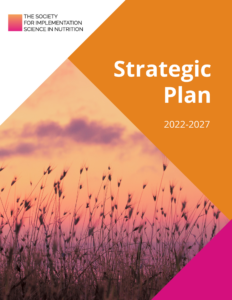Our Strategic Plan
Addressing the Unmet Needs for Implementing Nutrition Actions
The Unmet Needs
Millions of dollars have, and continue, to be invested in implementing nutrition interventions and programs. The effectiveness of these efforts is inconsistent, however, and the intended impact on outcomes unrealized. Increasingly, researchers and implementers are turning to implementation science to advance their understanding of how nutrition actions work in real-world settings. There is an existing body of theories, models, frameworks, methods and resources to facilitate these efforts, and a growing collection of examples of how implementation science has been successfully applied to inform and strengthen nutrition program delivery. But…
- Implementation science activities remain fragmented, not consistently applied across and within programs, and often initiated in response to poor implementation rather than as part of planning and ongoing implementation.
- Implementers lack guidance and support on how to apply implementation science theories, models, frameworks, and methods to nutrition actions, and how to tailor and adapt implementation strategies to their unique context, specific needs of their organization, and type of nutrition action.
- Academic researchers often fail to fully engage implementers in planning implementation research, leading to research questions and findings that do not reflect the needs of real-world program implementers.
- Program implementers working within similar contexts often face similar constraints and obstacles but lack mechanisms for shared problem solving or support.
- Implementation lessons and research findings are infrequently shared across stakeholder levels. Consequently, higher-level decision-makers (i.e., policymakers and donors) have insufficient understanding of the complexity of the implementation process, and community-level implementers are unaware of data, tools, and resources that would support and improve their work.
- Program implementers lack the funding, communications skills, and technical support required to disseminate their findings to external audiences (e.g., journal articles, webinars), resulting in frequently missed opportunities to advance the field of implementation science in nutrition and to improve implementation.
How do we address these unmet needs?
There is an urgent call for …
- Stronger linkages and effective communication between all stakeholders and levels of implementation
- Implementation research activities embedded within programs
- Adequate training and expertise to apply implementation science and research in LMICs
- Effective translation, dissemination, and exchange of information at all levels (especially locally).
It is time for collective action to address these unmet needs.
SISN’s new refreshed Strategic Plan will refocus our goals and activities to leverage our unique position as a leader in this space to foster interpersonal networks and meaningful exchange of expert, contextual, and implementation research-generated knowledge across global, national, and sub-national communities of researchers, practitioners, policy leaders and funders.
Collectively these goals will enhance the scale up and operationalization of implementation science in nutrition globally.
SISN’s Strategic Goals
The outputs from SISN’s inaugural (2016-2020) strategic plan established a strong foundation. While our Mission and Vision remain unchanged, over the next 5 years SISN’s activities will contribute to the following 3 strategic goals.


Our efforts to attain these goals will center around four strategic activities
To ensure the successful implementation of SISN’s strategic goals and activities, a detailed action plan with clear performance indicators and timelines will be developed. Progress on goals will be monitored and reviewed by the Board and/or Advisory Group at specified milestones.
Acknowledgments
The development of a new five-year strategic plan for SISN was a 12 months process involving two half-day retreats (July 2021), a listening phase (September to December 2021), a strategy drafting phase (January to March 2022) and a final dissemination phase (April to June 2022). The strategic refresh process was driven by the Strategic Refresh Working Group with financial support from the Bill & Melinda Gates Foundation.
We wish to express our gratitude to the nutrition implementation professionals who served on our Strategic Refresh Advisory Group and participated in stakeholder interviews. In addition countless other individuals have informally provided input and expertise. Their engagement has ensured that the diverse perspectives of people actively working in the space from low- and middle-income countries are represented in our revised strategic goals and activities.
Strategic Refresh Working Group Chairs:
Edward Frongillo (SISN President) and Rebecca Heidkamp (SISN Vice President)
Strategic Refresh Working Group:
Chowdhury Jalal, Mduduzi Mbuya, Andrea Warren, Megan Bourassa, Shannon King
Strategic Refresh Advisory Group:
Zewdie Birhanu, Jimma University, Ethiopia; Anabelle Bonvecchio Arenas, Instituto Nacional de Salud Pública, Mexico; Gladys Mugambi, Ministry of Health, Kenya; Monica Muti, Nutrition Interventions Manager, Ministry of Health and Child Welfare, Zimbabwe; Debora Niyeha, Chief of Party USAID Advancing Nutrition, Helen Keller International, Tanzania; Mini Varghese, Country Director, Nutrition International, India
Stakeholder Interviewees:
Monica Komboni, Ministry of Health & Child Welfare, Zimbabwe; Rosemary Kayanda, IMA World Health, Tanzania; Taren Swindle, University of Arkansas for Medical Sciences, USA; David Ma, University of Guelph, Canada; John Nicholson, John Snow International, USA; Audrey Tierney, University of Limerick, Ireland; Esther Choo, University of Washington, USA; Rufaro Madzima, Ministry of Health (Retired), Zimbabwe; Kenneth Sherr, University of Washington, USA; Anna Godfrey, Tanzania; Brad Wagenaar, University of Washington, USA; Saskia Osendarp, Micronutrient Forum, Netherlands; Morankar Sudhakar, Jimma University, Ethiopia
SISN Secretariat:
Caroline Skirrow, Naomi Cahill, Ariane Escritt
SISN’s refreshed strategic plan is bold and ambitious but this work is vital to addressing the unmet needs and to strengthen the implementation of nutrition actions.
SISN is committed to delivering on these strategic goals but SISN can’t achieve this alone, the Society must work together with partners and donors who share our vision.
Interested in learning more about SISN’s history?
- Read the inaugural Strategic Plan 2016-20 here
- Learn more about SISN’s past and current activities here
- Hear about how the Society was founded here
Feedback
We welcome your thoughts, comments and questions on SISN’s Strategic Plan. Please send any feedback to: info@implementnutrition.org.

